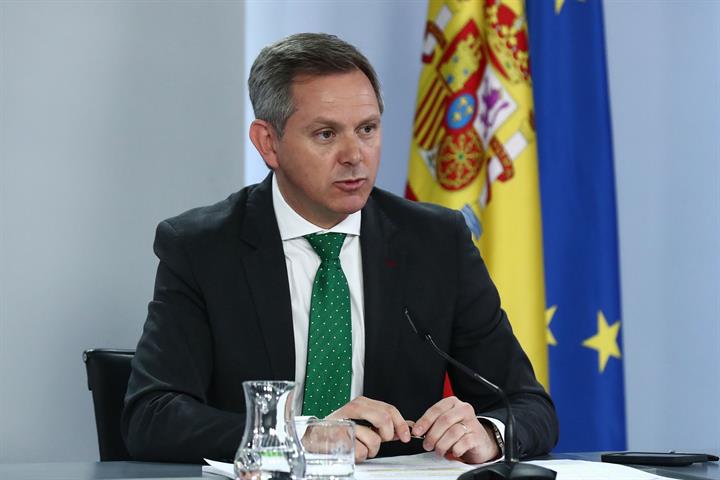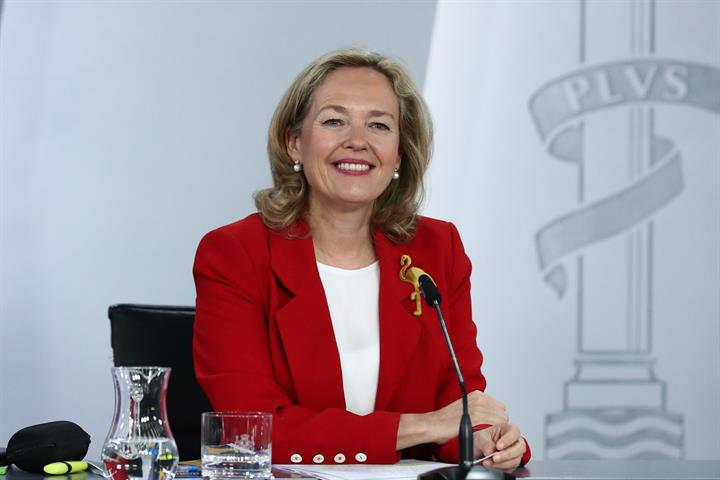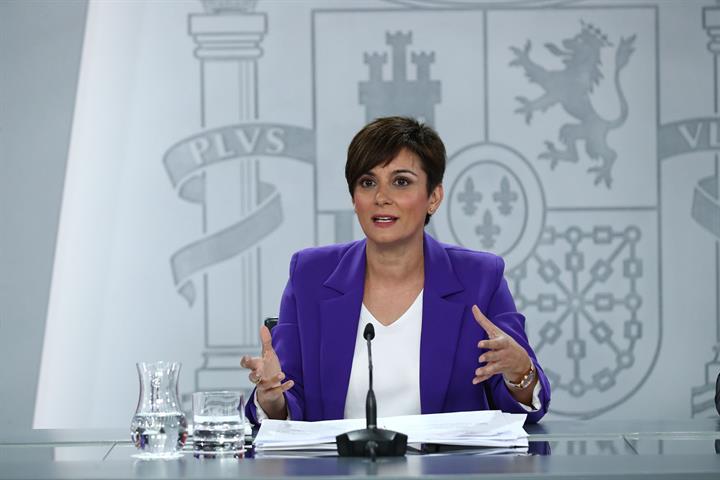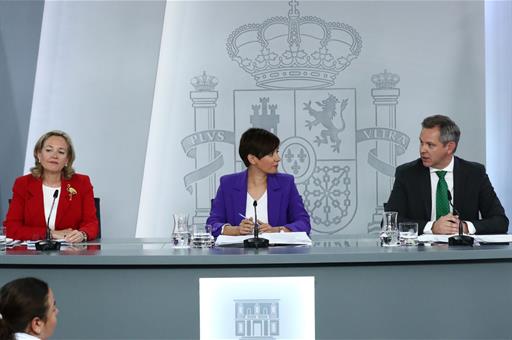Council of Ministers
The Council of Ministers strengthens primary care and boosts mental health care
Council of Ministers - 2023.5.23
Moncloa Palace, Madrid
The Council of Ministers has approved a Primary Care Infrastructure Improvement Plan (MINAP), endowed with €580 million, to optimise the centres' infrastructure and equipment.
The Minister for Health, José Miñones, stressed that this important investment in primary care does not come from the Recovery, Transformation and Resilience Plan, but from the national budget. It comes in addition to the €172 million approved last year to strengthen free public primary care.
Miñones specified that the government will transfer these funds to the regional governments, which must allocate them to the 13,000 health centres and clinics throughout the country. The priority, he said, is the financing of new physiotherapy, radiodiagnosis and emergency rooms, which will reduce waiting times, prevent overcrowding and avoid unnecessary journeys for the population.
The Minister for Health highlighted four aspects of the plan: bringing essential services closer to citizens, especially in the areas most affected by depopulation; guaranteeing basic rights such as health and equality for all; reinforcing the level of care, and bringing diagnostic, therapeutic and rehabilitative instruments closer to the population.
The minister said that the objective of the plan is to reinforce existing equipment, including ultrasound scanners, dermatoscopes, holters, defibrillators and equipment for outpatient surgery.
In this context, Miñones recalled that the government has earmarked almost €800 million of European funds, which has already been awarded to public hospitals throughout Spain, to purchase 851 high-tech devices to improve the diagnosis and treatment of cancer.
Mental health care
In the health sector, the government has also approved a transfer of €38.5 million to the regional governments to strengthen mental health care, of which €24 million will go towards the early detection of pathologies and the fight against stigma, while the remaining €14.5 million will be used to improve infrastructures related to community mental health.
 The Minister for Health, José Miñones, during the press conference after the Council of Ministers | Pool Moncloa/Fernando Calvo
The Minister for Health, José Miñones, during the press conference after the Council of Ministers | Pool Moncloa/Fernando Calvo
The minister detailed that new mental health units will be created, and existing ones will be renovated to achieve a comprehensive system of care.
José Miñones recalled the different measures set in motion by the Ministry of Health, including the Mental Health Plan 2022-2024, endowed with €100 million, which activated the suicide hotline via the 024 telephone number and, in its first year, has dealt with almost 119,000 calls and has identified and intervened in more than 8,500 cases of high or ongoing suicide risk.
Equal representation of women and men
The Council of Ministers has approved sending to the Spanish Parliament the draft of the Organic Law on Parity of Representation in Decision-Making Bodies, which will guarantee effective equality in politics, administration and business.
The First Vice-President and Minister for the Economy and Digital Transformation, Nadia Calviño, explained that the regulation transposes an EU directive that requires a minimum of 40% participation of the under-represented sex in the public and private decision-making bodies of large companies, the government, professional associations and juries for public awards, among other entities.
Compared to the initial version of the preliminary draft, the text includes two fundamental new aspects. First, the parity objectives extend to constitutional bodies and those of constitutional relevance, including the Constitutional Court, the Council of State, the Fiscal Council, the Court of Auditors and the General Council of the Judiciary. Second, the implementation timetable is made more flexible, extending from 2024 for companies with the largest market capitalisation to 2028 in the case of public interest entities.
The first vice-president framed the initiative within the framework of the laws on equality between men and women in the labour market, which have facilitated the reduction of the gender gap in activity and employment rates, and of the wage gap. "There is still a long way to go and today we are taking another step towards effective equality", said Nadia Calviño. She added that the law consolidates Spain "as one of the most advanced countries in the world in terms of gender equality".
National Artificial Intelligence Strategy
At the cabinet meeting, the first vice-president also presented a report on the progress of the National Artificial Intelligence Strategy. Calviño stressed that this issue "is high on the agendas of the main international economic and political forums", and that its regulation during the Spanish Presidency of the Council of the EU will mark the future direction in this area.
According to the vice-president, the government has "a very clear roadmap" to benefit from all the opportunities offered by innovation from an economic and social point of view, while also "guaranteeing security, trust and the protection of our rights and democratic values in the digital world as we do in the physical world".
 The First Vice-President and Minister for the Economy and Digital Transformation, Nadia Calviño, during her speech at the press conference after the Council of Ministers | Pool Moncloa/Fernando Calvo
The First Vice-President and Minister for the Economy and Digital Transformation, Nadia Calviño, during her speech at the press conference after the Council of Ministers | Pool Moncloa/Fernando Calvo
The National Artificial Intelligence Strategy, drawn up with universities, research centres, public administrations and social agents, has an initial allocation of €600 million from the European recovery funds. "Thanks to these resources, we have launched important projects that are turning our country into a pole of attraction for investment and talent on an international scale", said Calviño.
Among these initiatives, the vice-president mentioned the programme of research and development missions in artificial intelligence, the business projects to integrate artificial intelligence into value chains, and the RETECH projects, led by the autonomous communities. The next step will be the call for applications for grants to create the Artificial Intelligence Network of Excellence, with the aim of boosting national talent and attracting international talent.
Strategic and pioneering projects
Nadia Calviño pointed out that, in addition to these horizontal programmes, the government is launching "unique strategic projects", such as the PERTE New Language Economy to ensure that artificial intelligence "understands and thinks" in Spanish and the rest of the co-official languages; the National Plan for Green Algorithms to make artificial intelligence contribute to climate change adaptation, and initiatives in quantum computing and neurotechnology.
In addition, Spain has been a pioneer in approving a Charter of Digital Rights and in creating a state agency for the supervision of artificial intelligence. Together with the European Commission, Spain has also launched the first pilot programme of a test bed for the new European regulation on Artificial Intelligence.
Digital Youth Council
Also in the digital field, the government has set up the Youth Digital Council which, together with the rest of the advisory councils, will facilitate the integration of young people in the articulation of the public policies that are deployed in this field.
The first vice-president and minister for the economy and digital transformation has sent a letter to the presidents of the regional governments and organisations such as the Youth Council asking them to put forward their candidates, stating that "we expect your answers before 10 June".
Digital Agenda
In relation to the Digital Agenda, Nadia Calviño has announced that 18 University-Business Chairs will be launched in the next few days within the framework of the PERTE Chip to boost specialised capacity in the field of semiconductors, with an investment of €80 million for public and private universities.
With a public investment of €60 million, the call for Chip Missions will also be launched to promote and consolidate research centres for cutting-edge microelectronic design and the integrated photonics ecosystem.
Last, the vice-president pointed out that the government expects to receive next week the authorisation from the European Commission to launch the call for proposals for the Single 5G Active Networks Programme in June. With an investment of up to €550 million in European funds, the aim is for "5G mobile connectivity to reach the very rural areas of our country as soon as possible".
Promoting Decent Employment
 The Government Spokesperson and Minister for Territorial Policy, Isabel Rodríguez, during her speech at the press conference after the Council of Ministers | Pool Moncloa/Fernando Calvo
The Government Spokesperson and Minister for Territorial Policy, Isabel Rodríguez, during her speech at the press conference after the Council of Ministers | Pool Moncloa/Fernando Calvo
The Council of Ministers has approved the Annual Plan for the Promotion of Decent Employment 2023, which was drawn up in collaboration with the autonomous communities and specifies the objectives for this year in active employment policies.
The Minister for Territorial Policy and Government Spokesperson, Isabel Rodríguez, explained that the document plans and organises the joint services and programmes carried out by both the Public Employment Service and the services of the autonomous communities.
The aim of the plan, the minister emphasised, is to guarantee "the provision of the Public Employment Service in the most homogeneous way throughout the territory, with unity of criteria and compliant to the new employment law".
Rodríguez recalled that the total investment in Active Employment Policies amounts to more than €6 billion, which will be used in training initiatives in alternation with employment for the long-term unemployed, and to improve the evaluation of the programmes.
Recovery of the Mar Menor
The government has agreed to call for aid worth €20 million for the restoration and environmental improvement of the Mar Menor, with the aim of contributing to the recovery of the ecological wealth of this area. The line of aid is aimed at making agriculture more sustainable and restoring the balance between agricultural work and the regeneration of the Mar Menor.
Isabel Rodríguez specified that this decision has been taken to help reduce the use of pesticides and organic fertilisers, irrigation returns and erosive processes. The measure is part of a plan to protect the Mar Menor. "We are working to promote solutions based on nature, on the restoration and improvement of the landscape and the environment of the Mar Menor," said the minister.
Other agreements
The Council of Ministers has agreed to submit to the Spanish Parliament the draft law regulating the Royal Theatre Foundation. Like other major cultural institutions such as the Prado Museum and the National Library, the theatre will have its own regulations and, as Isabel Rodríguez stressed, it will be "a modern opera house, with the demands and dynamism required of contemporary performing arts worldwide".
The government has also approved the creation of the Centre for Innovation and High Performance Technification of Vocational Training in Segovia. The spokeswoman explained that it will be the first laboratory for innovation and applied research in vocational training at national level, where around 1,000 teachers from all over the country will be trained every year.
Non official translation





